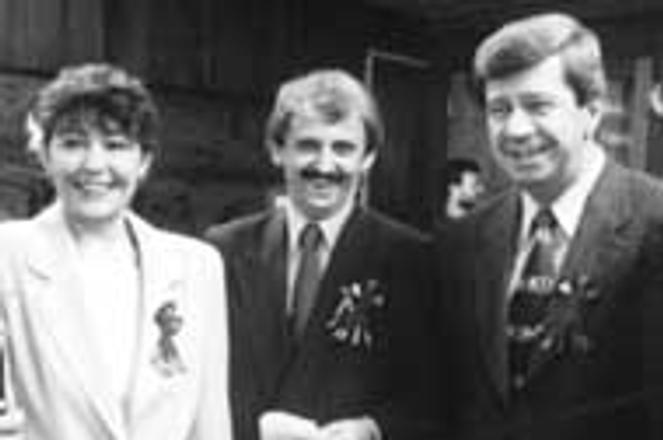United, at least on paper. The SDK became a single party on July 4.Vladimír Hák
Forced to unite by the recent amendment to the election law that banishes coalitions, the SDK claims it stands ready to brawl after its July 4 congress ratified the formation of a single party with the single purpose of handing Premier Vladimír Mečiar his first election defeat.
Faced with slumping poll numbers, the scandal of its group allegedly bribing journalists and rumors of internal disarray, SDK leaders' strategy was to use the congress meeting, held in the western Slovak town of Trnava, to show strength and unity that would lead them to election victory and beyond.
In an effort to display such unity, designated representatives of all founding parties were smoothly elected as members of the SDK leadership, with Mikuláš Dzurinda, formerly from Christian Democratic Movement, becoming the chairman. Ján Langoš (formerly of the Democratic Party), Eduard Kukan (formerly of the Democratic Union), Jaroslav Volf (formerly of the Social Democratic Party of Slovakia), and Anton Juriš (formerly of the Green Party of Slovakia) were all elected vice-chairmen.
Dzurinda used the opportunity to unveil SDK's platform. Hoping to attract voters with big promises, he offered to double wages and pensions in the next four years, while simultaneously lowering taxes. When asked whether the promises were realistic, Dzurinda answered, "I can assure you that this all is based on the work of our expert groups."
Party leaders also pledged to lower unemployment under 10%, radically increase housing construction and review privatization conducted by the current Mečiar administration. Vojtech Tkáč, a HZDS member and Minister of Labor and Social Affairs, commented for Twist Radio: "If the SDK manages to carry out this program, I myself will become a member."
Dzurinda refuted all accusations of populism or leftism. "The principal feature of the SDK is responsibility," he said. "If the Constitution is ignored and unbelievable laws are passed, I cannot say whether it's for the left or the right to rectify these mistakes."
The SDK has become what's called "an election party." The creation of such parties was effectively mandated by the new election law that barred parties from running together in coalitions. The only members comprising the SDK party will be the 128 SDK candidates nominated by the five member parties for Parliamentary seats.
However, the SDK will not be dissolved right after the elections. "We are going to continue afterwards," said Kukan. Added Volf: "Our priority is to carry out our policies together." Dzurinda pointed to the Polish right-wing AWS party which consisted of as many as 38 parties, but managed to stick together after their last election victory, as proof that the SDK would make it work.
Regarding possible cooperation with other parties, Dzurinda said that the SDK wanted to govern with all "democratic parties," meaning the SDĽ, a party of reformed communists, the SOP, a new party of Košice Mayor Rudolf Schuster, and the SMK, a party of ethnic Hungarians that was forged in the same way as the SDK.
The SDK was the most popular grouping in polls ever since its birth until just recently. "The average [preference] in June was 20.3 % for the SDK, and 23% for the HZDS," admitted Dzurinda, adding that he was inspired by Václav Klaus, who managed to come back from the political graveyard to win 28% of the vote. "I hope that our election result will begin with the figure '3'," he said.


